- Clone
- C18.2 (See other available formats)
- Regulatory Status
- RUO
- Other Names
- Interleukin-12 p70, Cytotoxic lymphocyte maturation factor (CLMF), Natural killer cell stimulatory factor (NKSF)
- Isotype
- Rat IgG2a, κ
- Ave. Rating
- Submit a Review
- Product Citations
- publications
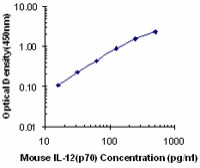
| Cat # | Size | Price | Quantity Check Availability | Save | ||
|---|---|---|---|---|---|---|
| 511801 | 50 µg | £65 | ||||
| 511802 | 500 µg | £209 | ||||
Interleukin 12 (IL-12) is a heterodimeric pleiotropic 70 kD (p70) cytokine consisting of a 40 kD (p40) subunit and a 35 kD (p35) subunit. IL-12 is a potent regulator of cell-mediated immune responses and key mediator of Th1 cell development. Bioactive IL-12 is secreted by activated B lymphocytes, dendritic cells, and macrophages in response to pathogens or upon interaction with activated T cells.IL-12 p70 stimulates cytotoxic T, NK and LAK cell proliferation, andinduces IFN-γ and TNF production in resting and activated T and NK cells.It has been suggested that IL-12 may have therapeutic potential as a vaccine adjuvant that promotes cellular-immunity and as an anti-tumor and anti-viral agent.
Product DetailsProduct Details
- Verified Reactivity
- Mouse
- Antibody Type
- Monoclonal
- Host Species
- Rat
- Immunogen
- CHO expressed, recombinant mouse IL-12 p70
- Formulation
- Phosphate-buffered solution, pH 7.2, containing 0.09% sodium azide.
- Preparation
- The antibody was purified by affinity chromatography.
- Concentration
- 0.5 mg/ml
- Storage & Handling
- The antibody solution should be stored undiluted between 2°C and 8°C.
- Application
-
ELISA Capture
- Recommended Usage
-
Each lot of this antibody is quality control tested by ELISA assay. For use as an ELISA capture antibody, a concentration range of 1-4 µg/ml is recommended. To obtain a linear standard curve, serial dilutions of IL-12(p70) recombinant protein ranging from 500 to 4 pg/ml are recommended for each ELISA plate. It is recommended that the reagent be titrated for optimal performance for each application.
- Application Notes
-
ELISA Capture: The purified C18.2 antibody is useful as a capture antibody for a sandwich ELISA assay, when used in conjunction with the biotinylated C17.8 antibody as detection antibody and recombinant mouse IL-12 p70 as the standard.
- Product Citations
-
- RRID
-
AB_2123771 (BioLegend Cat. No. 511801)
AB_2123769 (BioLegend Cat. No. 511802)
Antigen Details
- Structure
- heterodimeric cytokine composed of p40 subunit shared with IL-23 and a specific p35 subunit
- Distribution
- Secreted by dendritic cells, monocytes/macrophages, B cells, T cells
- Function
- Downregulated by IL-10; homodimeric p40 antagonistic to functional p70 heterodimer; p40 monomer has no function; p40 subunit in common with IL-23
- Interaction
- T cells, NK cells
- Ligand/Receptor
- IL-12Rβ1 binds p40 shared with IL-23; dimeric with IL-12Rβ2 binds p35
- Bioactivity
- IL-12 p70 (p40:p35) induces IFN-γ, TNF-α production in T and NK cells; costimulation of PBL proliferation; proliferation/differentiation of TH1 T lymphocytes.
- Cell Type
- Dendritic cells, Monocytes, Macrophages, B cells, T cells
- Biology Area
- Immunology
- Molecular Family
- Cytokines/Chemokines
- Antigen References
-
1. Lankford CS, et al. 2003 J. Leukoc. Biol.. 73:49.
2. Parham C, et al. 2002 J. Immunol.. 168:5699.
3. Fitzgerald K, et al. Eds. 2001. The Cytokine FactsBook. Academic Press San Diego.
4. Trinchieri G, et al. 1993 Immunol. Today. 14:335.
5. Quesniaux V. 1992. Research Immunol. 143:385.
6. Trinchieri G, et al. 1992 Prog. Growth Factor Res. 4:355. - Gene ID
- 16159 View all products for this Gene ID 16160 View all products for this Gene ID
- UniProt
- View information about IL-12 p70 on UniProt.org
Related Pages & Pathways
Pages
Related FAQs
Other Formats
View All IL-12 (p70) Reagents Request Custom Conjugation| Description | Clone | Applications |
|---|---|---|
| Purified anti-mouse IL-12 (p70) | C18.2 | ELISA Capture |
Customers Also Purchased
Compare Data Across All Formats
This data display is provided for general comparisons between formats.
Your actual data may vary due to variations in samples, target cells, instruments and their settings, staining conditions, and other factors.
If you need assistance with selecting the best format contact our expert technical support team.
 Login / Register
Login / Register 







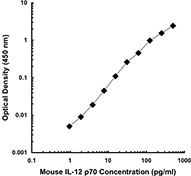
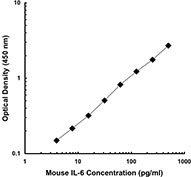

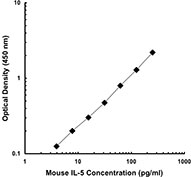
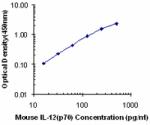



Follow Us